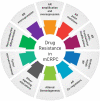Drug resistance in metastatic castration-resistant prostate cancer: an update on the status quo
- PMID: 36176747
- PMCID: PMC9511807
- DOI: 10.20517/cdr.2022.15
Drug resistance in metastatic castration-resistant prostate cancer: an update on the status quo
Abstract
Prostate cancer (PCa) is a leading cause of cancer-related morbidity and mortality in men globally. Despite improvements in the diagnosis and treatment of PCa, a significant proportion of patients with high-risk localized disease and all patients with advanced disease at diagnosis will experience progression to metastatic castration-resistant prostate cancer (mCRPC). Multiple drugs are now approved as the standard of care treatments for patients with mCRPC that have been shown to prolong survival. Although the majority of patients will respond initially, primary and secondary resistance to these therapies make mCRPC an incurable disease. Several molecular mechanisms underlie the development of mCRPC, with the androgen receptor (AR) axis being the main driver as well as the key drug target. Understanding resistance mechanisms is crucial for discovering novel therapeutic strategies to delay or reverse the progression of the disease. In this review, we address the diverse mechanisms of drug resistance in mCRPC. In addition, we shed light on emerging targeted therapies currently being tested in clinical trials with promising potential to overcome mCRPC-drug resistance.
Keywords: Prostate cancer; androgen receptor; drug resistance; mCRPC; novel targeted therapeutics.
© The Author(s) 2022.
Conflict of interest statement
DM reports institutional funding from Astellas, Personal travel support/honoraria from Astellas, Janssen, Bayer, Ipsen, BMS, and MSD. All authors declared that there are no conflicts of interest.
Figures

References
Publication types
LinkOut - more resources
Full Text Sources
Research Materials
